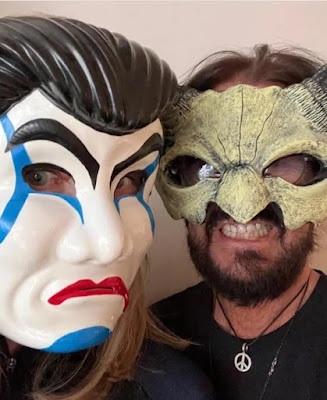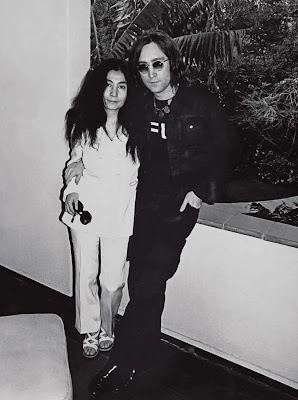 |
| Photo taken by Linda McCartney |
Pages
Thursday, October 31, 2024
Wednesday, October 30, 2024
That'll Be The Day
Things I noticed:
- Ringo is wearing the jacket he also wears in the film
- Ringo is wearing a John Lennon button.
- Ringo's date is Nancy Andrews.
- Ringo is sitting next to Harry Nilsson's future wife, Una
- Una is wearing a Harry Nilsson button.
- Keith Moon is wearing a tie with moons on it.
Tuesday, October 29, 2024
A Beatle Still Flutters Pulses
A Beatle Still Flutter Pulses
By Dorthy Collin
The Chicago Tribute
November 17, 1976
George Harrison is a scrawny, 33-year-old who wears rubber sole wedgies. He looks like an aging long hair, an ordinary man. But he is not an ordinary man.
He is a Beatle. And anyone who was alive in the 1960s and not wiling the time away in a cave, knows what that means.
What it meant Monday night was that perfectly sane people went gaga. Oh, not like they once did during the heights of Beatlemania. No one at the party Warner's Records gave it the Ambassador West really screamed. No one tugged in ecstasy at his or her hair unless it was to stabilize the slipping wig. No one fainted, but the guests at the party acted funny.
They tried to be blase, especially since most of them were rock critics or disc jockeys, and it's not cool to be impressed with celebrities if you're a rock critic or DJ. But as soon as Harrison bounded in, they gathered around in threes and fours, asking questions, getting their pictures taken.
At one point, a reporter who had interviewed more celebrities than People Magazine was spotted cuddling up to Harrison, the photographer snapping away. "I figured this one, I'll show my grandchildren." She said, "he's a living legend!"
That's what the kids outside the hotel said, too. A group of 20 or so waited four hours to see George arrive and to see George leave. "I'm one of the original Beatles freaks", said one young woman who was clutching wallet-sized photos circa1966 of the Beatles, when they were still the Fab Four, instead of millionaire museum pieces. Some others who had come all the way from Aurora were nearly revertas though they thought the Second Coming might be about to take place in the Sarah Sitton room. "We just came to see him."
Once inside, Joe Bergman of Warners, who once worked for the Beatles and later for the Rolling Stones, was trying to separate the uninvited from the invited. Two of the more inventive crashers had walked in saying they were guests of Tribune columnist Aaron Gold. They were discovered when the security man at the door told Gold that his two guests were waiting for him. "What two guests?" asked Gold. They're asked to leave, but not before they got what they came for. George.
He arrived amid squeals and flashbulbs and memories. "Which one is he? Which one is he?" Yelled, a middle-aged woman. A couple of token groupies lunged to touch George's sweater while the security men went through the ritual of protecting the star. And there he was. It was a real, live Beatle a foot away, not on a stage at home plate at Comiskey Park. It was a genuine, authentic beetle on the hoof, not part of one of those retrospectives of the 60s with slapped photos of Martin Luther King and Jack Kennedy and Vietnam and the Beatles into meaningful collages. It was a Beatle who sounded like a Beatle with that familiar voice and accent that proves you can take the boy out of Liverpool, but you can't take...
In between posing for their pictures, which will be autographed by Harrison and sent to them, the writers and DJs got in a few questions. One group asked about the "So Fine" affair in which Harrison was sued for borrowing that song and calling it "My Sweet Lord."
"Every combination of notes you start to play has been used somewhere," he said, "Either it was going to make me paranoid, or I could decide to be positive." He decided to be positive and wrote a song about the experience. Another group asked if he really was going to appear on Saturday Night Live. "Yeah, wouldn't you?" He said, "It was an offer I couldn't refuse." Eventually, someone got around to asking Harrison the $20 million question, "Would the Beatles ever play together again?" "Maybe under certain circumstances," he said, "but we've grown up and separated. It's like asking someone to go back to his ex-wife. I can see that the Beatles meant so much to people. The Beatles were good, like a good cake, and when it was broken down into its separate pieces, they were only average." Only average, but they seemed forever linked.
After the dinner and a few little speeches, Harrison chatted up the crowd, played some tapes from his new record album, and showed some films. Though they were shot by a member of the Monty Python madness, the film seemed like outtakes from Help! or A Hard Day's Night and the music, well, it was Harrison, and there was something about it, something that made me happy, that tickled my memory and emotions and brought back feelings of good times and good friends. It got to the others, too, who clapped and smiled while Harrison did an impromptu dance before signing more autographs.
Then, it was time to ease through the crowd and into his limousine, and he was gone. Left behind in the empty dining room were two young women dressed like Kings Road birds of the 60s who had managed to touch a Beatle. They were on the hunt for more souvenirs, even offering to buy a press kit from a reporter. They tried to explain. "Meeting George Harrison was my goal." said one. "I met John Lennon once, and it took me a year and a half to plan it." But why? "I'm attracted to quiet people," she said. I let it be.
Calling John Lennon
This wasn't in the Daytime Revolution film, but while on the Mike Douglas Show, John looked up people named "John Lennon" in the phone book and gave them a call.
Monday, October 28, 2024
John and Yoko's Love for San Francisco
A Death in the Life
By Herb Caen
December 9, 1980
The San Francisco Examiner
I met John Lennon and Yoko only once here in July of 1972. We ate at the Mandarin and then sat at a table outside Enrico's Coffee House. John and Yoko were dressed in black, generous with their eye contact as a crowd swiftly gathered. A not-at-all-young stockbroker grabbed Lennon's arm and said, unexpectedly, "You're a great guy!" Panhandlers edged forward and rewarded at $5 a crack "rich tax." Lennon smiled. Young girls offered flowers, joints themselves.
In a quieter corner, Lennon peered out a window through his bottle-thick glasses and said, "We're crazy about this city. First time we came here, we walked the streets all day, all over town, and nobody hassled us. People smiled, friendly-like and we knew we could live here. In Los Angeles, that's just a big parking lot where you buy a hamburger for the trip to San Francisco. The food in this city is fantastic! Better than London! More variety and the strange lights. We've never been in a city with light like this. We sit in our hotel room at the Myako for hours watching the fog come in and the light change."
John and Yoko had arrived here in a beat-up Volkswagen. "We drove from New York," he said, "Yoko and I have probably seen more of the United States than most Americans. Unitedstatians? When I was a Beatle, I didn't see anything. Whoosh, whoosh, whoosh. In Nevada, we got out of the car and rolled in the sand. We've never seen a desert before. We want to live here permanently. There's violence, sure, and it's scary sometimes, but there are so many good people, so many chances for change." John and Yoko nodded together when he said that their eyes bright.
















.jpg)
.jpg)




.jpg)



.webp)



























